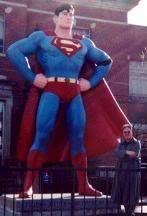| Pop Culture Gadabout | ||
|
Saturday, March 25, 2006 ( 3/25/2006 07:17:00 AM ) Bill S. "WHY MUST I BECOME PART OF THE PROBLEM TO SHOW YOU THE ANSWER?" – Makes sense that AiT/Planet Lar would issue a new edition of Brian Wood's Channel Zero as the movie version of V for Vendetta hits the theaters. Both stories deal with oppressive dystopian societies – and the rebels who fight against 'em – though where Britisher Alan Moore's consideration of future fascism was informed by the Thatcher Era, Wood's work works its paranoid extrapolation out of pre-9/11 Giuliani NYC and its much-touted city clean-ups. If both works reflect the concerns of the years in which they were written, they also remain germane in these terror-focused times. The heroine of Zero, Jenny 2.5, isn't as violent as the Gunpowdery V: a conceptual media artist, she specializes in broadcasting three-second art bombs over the teevee airwaves in an America where all of the media is government controlled and mere possession of broadcast capacity is itself grounds for arrest. Shooting out challenging slogans that could only come from the mind of a disaffected twenty-something ("Your mind is a weapon. Use it.") – or a jaded adman struggling to grab onto the Youth Market – she becomes a public sensation and a fugitive. The problem is that the public has grown so accustomed to viewing television as a diversion that has little to do with its own lives (even as it receives all its carefully parceled "news" from the medium) that they don't see Jenny's on-air challenges as anything more significant. When the authorities capture her, they arrange her arrest to get the most airtime possible, knowing that the viewing audience will see it as an entertainment much like the O.J. arrest. As the book's writer/artist, Wood keeps things crowded and oppressive. There are few big moments in the story – even when Jenny gets arrested, we don't see her imprisonment; she just shows a little while later, inexplicably set free – as the focus is on the way that omnipresent media more slowly chips away at us. Wood regularly fills his heavily shadowed black-&-white panels with icons and text of news feeds demonstrating the culturally repressive world that the U.S. has become, and in the middle of the book he moves away from Jenny to show us a New York City "cleaner" who is to street cleaners what Ray Bradbury's firemen were to firefighters: a violent protector of the new norm. Unlike Moore's V for Vendetta, the book doesn't end on the promise that this totalitarian system is gonna change; rather, it ends on the vaguest promise of a mere wisp of a hope. Zero is Wood's first book, and, as with many early works you can see the impatience of an artist unsure if he's gonna get a second chance to do what he's doing. This impulse leads the writer to proclaim more than he sometimes demonstrates, sometimes at the expense of details that would shore up his story. Still, the feel of this extended negative mood piece is heartfelt and convincing – and his panels reward multiple viewings. Nowadays, Wood appears to have abandoned the graphics side of comics work for collaboration with other young artists. I'd be interested in seeing what the guy could do today on his own with some of his smaller, less broad-stroked scripts. Smart reissue, Planet Lar . . . # | |
|
|

